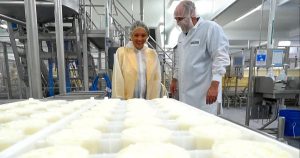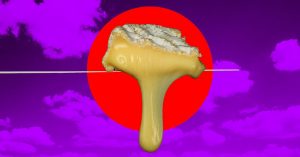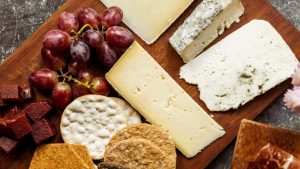
That’s how Oak Creek became home to a cheese cave that ages its Wisconsin-made raclette, an Alpine-style cheese with roots in France and Switzerland.
The wheels maturing in Oak Creek are made by Alpinage Artisan Cheese on a dairy farm in Kewaunee County and brought to Milwaukee County for finishing.
Alpinage sold its first wedge of raclette in August 2021, at the Whitefish Bay Farmers Market. The cheese, sold under the Mount Raclette name, now is available in more than a dozen stores around Milwaukee and beyond, and is served at an upscale restaurant.
And it started in part because Orphee Paillotin, working in Milwaukee as an IT engineer for a French company, was thinking about the foods of his native France that weren’t easily found here.
Such as raclette, the cheese that’s melted in a communal, convivial setting — among friends and family at home, or served in a restaurant. Traditionally, it’s eaten melted over boiled potatoes, maybe with some bacon, and accompanied by cornichons, the tiny pickles. Sometimes raclette is served with cured meat, like dried beef or salami, and sometimes with baguette instead of potatoes. A glass or two of white wine wouldn’t be out of place.
Alpinage is among few places in Wisconsin that make raclette.
Roelli Cheese Haus of Shullsburg makes Treeline raclette, which is aged at Crown Finish Caves in Brooklyn, N.Y., and Door Artisan Cheese of Egg Harbor makes a version called Daclette, according to the Dairy Farmers of Wisconsin. Swiss-based Emmi, which makes Roth cheeses in Wisconsin, makes its raclette in Switzerland.
“I was a little bit missing the stuff I used to eat,” Paillotin said.
He wasn’t alone; he noticed other people from France in a Facebook group were looking for raclette around Milwaukee.
“It’s not just another cheese,” Paillotin said, because of the socializing that surrounds it.
For most people, the matter would have gone no further, but Paillotin had met Paula Heimerl in Milwaukee in 2014, while watching France play in the World Cup. They’ve been together since then, and from the beginning, she said, they’ve talked about wine and cheese.
And Heimerl knows cheese. She grew up in a sixth-generation dairy-farm family; her parents opened a cheese company, Saxon Creamery, in 2007 and used the raw milk produced at the farm to make cheese. (They’ve since retired and sold the company.)
“I was expressing my frustration about the cheese I couldn’t find,” Paillotin recalled. “They said, ‘What about you just make it?’ I said, ‘Sure, we can try that.’ ”
He’d always had an interest in food, and the thought of starting his own company interested him, too, though he continues to work in IT full time. Heimerl, working in interior design, had longed to return to the family business of making and selling cheese.
“My mom and I and one of my sisters would do farmers markets around the state. That was a great time. I wanted to get back to that,” Heimerl said.
And, just as her family did at Saxon Creamery when they operated it, she and Paillotin now perform every aspect of the business — from making the cheese and aging it to marketing it and distributing it.
“It’s come full circle,” Heimerl said.
Time to make cheese. But first …
Since Wisconsin is the only state in the country that requires cheesemakers to be licensed before selling cheese, Paillotin began cheesemaking classes at the University of Wisconsin in January 2019 to prepare.
UW’s Center for Dairy Research was a key resource on his path, he said. He also trained with cheesemakers in France, and Heimerl’s father, Jerry, mentored him all along the way. “He’s been our best advocate,” Paula Heimerl said.
Paillotin was licensed in 2020, “right in the middle of the pandemic,” he said. Then he set about launching Alpinage (the name, pronounced ahl-pin-ahj, combines Alpine and affinage, the term for aging cheese).
“It’s very capital intensive. There’s no such thing as a small cheese company; it doesn’t exist,” Paillotin said. Cautious about taking on debt, he used his own funds and grants he was awarded to launch the company.
He knew he wanted to make a naturally aged cheese, which is stored in temperature-controlled open air for an edible rind. “I really wanted to bring the traditional cheese” to market, he said.
Sounds simple.
“It was extremely complicated,” he said.
That’s partly because Alpinage’s cheese had to be made with raw milk.
“We are not heat treating the milk, so it leaves enzymes later on to develop good flavor, and it leaves a lot of healthy nutrients in the cheese,” Heimerl said.
It also adds a layer of complexity and rules to production to ensure the cheese is safe. It’s why U.S. regulators require raw milk cheeses to be aged at least two months.
Few cheesemaking plants accept raw milk, and if they do, they rarely want an outside company to use their equipment, Paillotin said. He was happy to find the Kewaunee County dairy farm; its cheesemaking equipment is so close to the milking parlor, the milk still is warm when Alpinage receives it to make the cheese, Paillotin said.
Next, he needed a cheese cave to age his raclette — in modern times, the cave typically is a cooler or refrigerated room. But he couldn’t find an existing cheese cave that would accept the cheese.
“You cannot just store it in a cold room and leave it there,” he said. “So that’s where I decided to open my own dairy plant.”
With rents in Milwaukee out of his budget, Paillotin searched for eight months before he found Alpinage’s home in Oak Creek. It was a small storefront, in an outdoor mall of shops and offices near Chicago and Puetz roads, but it fit his needs perfectly, he said.
It took a year for Alpinage to get its dairy plant license, after passing muster on the local, state and federal levels.
Finally, in May 2021, Alpinage made its first batch of cheese and began aging it on wooden boards, washing the rinds regularly with brine that helps the cheese develop its flavor.
Heimerl, who quit her design job to work full time at Alpinage, drives two hours every Thursday to the dairy farm to make the cheese.
It has to rest overnight in a tank of brine, so she drives the wheels to Oak Creek the next day. While she waits for the cheese to be ready, she visits her parents, who now live in Green Bay.
At first, Alpinage was making a batch of 200 pounds of cheese about every two months; lately, it’s been making 200 pounds a week.
“Now we’re going to be able to do 500 to 600 pounds a week” with the new equipment, Paillotin said.
Entering the cave
Much of Alpinage’s space, about 200 square feet, is given over to the cave, a refrigerated room set at 54 degrees.
Humidity in the cave should be no lower than 92% and optimally around 95%. If the humidity dips too much, cheese can lose weight through evaporation as it rests in the open air for two months or longer, Paillotin observed. “If you lose cheese, you lose money, too,” he said.
Metal racks hold wooden boards made of poplar; poplar’s tight grain means it’s easy to clean yet lets the cheese breathe. (Spruce would have been the first choice, but it’s harder to come by in the U.S. than it is in France, Paillotin said.)
And on each 1-inch-thick wooden board are two wheels of raclette. About 100 wheels were in the cave recently after some had been distributed to shops, but new equipment that arrived this month will allow Alpinage to produce and hold 450 wheels at once.
A soft-bristled brush is used to apply a brine of water, salt and cheese cultures, washing each wheel of cheese with it, letting it dry and then flipping the cheese to wash the other side.
It’s applied every day for the first few weeks. Once the rind forms, the wheels are washed twice a week until they’re ready to eat two months or so later.
“It’s very, very intensive in terms of labor,” which is probably why relatively few cheesemakers do it, Paillotin said.
The cheese cave also is aging wheels of manchego for another Wisconsin cheesemaker; that cheese doesn’t require washing.
What’s raclette like?
Alpinage makes two styles of raclette now, using two aging cultures.
One, called classic, results in a bolder, mushroomy flavor in the cheese, Paillotin said. The other produces a version called mild, which Alpinage plans to rename Summer. “It’s sweet, sunny and the rind is a little more sunny, as well,” Paillotin said.
Like other Alpine cheeses, semi-hard raclette has a nutty flavor.
Alpinage’s only two employees are Heimerl and Paillotin. It’s an all-consuming job.
“I think about cheese all the time,” Paillotin said. “I go to bed, I think about cheese.”
But, he said, “seeing people try your food and making them happy, that’s really cool.”
Heimerl relishes working in the field again, where women still are in the minority.
“I think it’s really rewarding to be able to make something with your own two hands,” she said.
And, Heimerl said, “I feel like I’m putting my own mark on the cheese world.”
What’s ahead
Paillotin said Alpinage is working on a new recipe for a cheese not widely available here. It’s been experimenting with flavors in a wheel or two from a given batch, such as cumin or cracked pepper, and he recently bought ramps — wild leeks — at Outpost Natural Foods to try in cheese.
But he doesn’t want to overdo it. “It would be a pity if the flavor took over,” he said.
Soon, Alpinage will start making mini raclette, wheels 4 inches in diameter that can be sold to consumers intact.
The wheels Alpinage has been making are 10 inches and 7 to 8 pounds, which then are cut at stores and sold in wedges. Other new molds that recently arrived will allow the company to make 12-inch wheels, likely weighing 9 to 10 pounds.
While at the Fancy Food Show in Las Vegas in February, with assistance from the Dairy Farmers of Wisconsin, “We realized making small-format cheese is what distributors and stores are looking for,” Paillotin said. “You don’t have to process it. You don’t have to cut it.”
And cheese that doesn’t require cutting and shrink-wrapping before it’s stocked on shelves is a cheese that practically sells itself during a national labor shortage.
Where to find Alpinage raclette
Shoppers can find Alpinage’s raclette in more than a dozen stores and at several summertime farmers markets.
The price can vary from $16 to $25 a pound, and the cheese often is sold packaged in wedges of a half-pound or so, although Alpinage will begin producing whole 4-inch mini-wheels in the coming months in addition to full-sized wheels.
The cheese is sold in larger quantities through the Alpinage website, alpinagecheese.com.
Also, one Milwaukee restaurant — Birch, at 459 E. Pleasant St. — serves raclette over New York strip steak on the current menu.
























